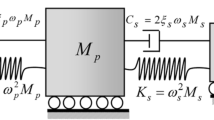Abstract
Performance Measure Approach (PMA) is an alternative way for evaluation of probabilistic constraints in reliability-based design optimization other than traditional Reliability Index Approach (RIA). In PMA, the probabilistic performance measure (PPM) is obtained through locating the minimum performance target point (MPTP) with the specified target reliability index in standard normal space, which is also called inverse reliability analysis. The advanced mean-value (AMV) method is well suitable for locating MPTP due to its simplicity and efficiency. However, AMV may have difficult to converge for highly nonlinear performance function. In this paper a step length adjustment (SLA) iterative algorithm, which introduces a “new” step length to control the convergence of the sequence, is proposed. This step length is new because the line search process for step length selection is not needed and it may be constant during the whole iteration process or decrease successively several times using a self-adjust strategy. It is proved that the AMV method is a special case of the SLA algorithm when the step length tends to infinity and the reason why AMV diverges is illustrated. SLA is as simple as AMV and does not need the prior knowledge of convexity or concavity of the performance function as other modified algorithms do. Numerical results of several highly nonlinear performance functions including an engineering application indicate that SLA is effective and robust.










Similar content being viewed by others
Abbreviations
- RBDO:
-
Reliability-based design optimization
- RIA:
-
Reliability index approach
- PMA:
-
Performance measure approach
- MPFP:
-
Most probable failure point
- PPM:
-
Probabilistic performance measure
- MPTP:
-
Minimum performance target point
- AMV:
-
Advanced mean value
- CMV:
-
Conjugate mean value method
- HMV:
-
Hybrid mean value method
- EHMV:
-
Enhanced hybrid mean value method
- CC:
-
Chaos control
- MCC:
-
Modified chaos control
- SLA:
-
Step-length-adjustment iterative algorithm
- d :
-
Design variable vector
- x :
-
Original random vector
- u :
-
Standard Gaussian vector
- G j (d, x):
-
The j-th limit state function or performance function
- P f (⋅):
-
Failure probability of performance measure function
- P j, t :
-
The prescribed acceptable failure probability
- d L, d U :
-
Lower and upper bounds of design variable
- β j, t :
-
The j-th target reliability index
- Φ(⋅):
-
Standard normal cumulative distribution function
- g(d, u):
-
Performance function in standard normal u-space
- G p (d):
-
Probabilistic performance measure
- u ∗ :
-
Minimum performance target point
- u k :
-
The k-th iteration point on the target reliability sphere surface
- ∇ U g(u k):
-
The gradient vector of performance function at point u k
- n(uk):
-
Normalized steepest descent direction at point u k
- λ :
-
Step length
- c :
-
Adjusting coefficient for step length
References
Arora JS (2012) Introduction to Optimum Design, 3rd edn. Academic Press, Waltham, Chapters 10 and 11
Chiralaksanakul A, Mahadevan S (2005) First-order approximation methods in reliability- based design optimization. ASME J Mech Des 127:851–857
Der Kiureghian A, Zhang Y, Li CC (1994) Inverse reliability problem. ASCE J Eng Mech 120(5):1154–1159
Du XP, Sudjianto A, Chen W (2004) An integrated framework for optimization under uncertainty using inverse reliability strategy. ASME J Mech Des 126(7):562–570
Frangopol DM, Corotis RB (1996). Reliability-based structural system optimization: state-of-the-art versus state-of-the-practice. Proc. 12th conference held in conjunction with structures congress XIV, 67–78
Lee JJ, Lee BC (2005) Efficient evaluation of probabilistic constraints using an envelope function. Eng Optim 37(2):185–200
Lee JO, Yang YS, Ruy WS (2002) A comparative study on reliability-index and target-performance-based probabilistic structural design optimization. Comput Struct 80:257–269
Li H, Foschi RO (1998) An inverse reliability method and its application. Struct Saf 20:257–270
Liu PL, Der Kiureghian A (1986) Optimization algorithms for structural reliability analysis, Report No. UCB/SESM-86/09, Department of Civil Engineering, Division of Structural Engineering and Structural Mechanics, University of California, Berkeley, CA
Meng Z, Li G, Wang BP, Hao P (2015) A hybrid chaos control approach of the performance measure functions for reliability-based design optimization. Comput Struct 146:32–43
Nikolaidis E, Burdisso R (1988) Reliability based optimization: a safety index approach. Comput Struct 28(6):781–788
Tu J, Choi KK, Park YH (1999) A new study on reliability based design optimization. ASME J Mech Des 121(4):557–564
Yang DX, Yi P (2009) Chaos control of performance measure approach for evaluation of probabilistic constraints. Struct Multidiscip Optim 38(1):83–92
Yang RJ, Gu L (2004) Experience with approximate reliability-based optimization methods. Struct Multidiscip Optim 26(2):152–159
Yi P, Cheng GD, Jiang L (2008) A sequential approximate programming strategy for performance- measure-based probabilistic structural design optimization. Struct Saf 30:91–109
Youn BD, Choi KK (2004) An investigation of nonlinearity of reliability-based design optimization approaches. ASME J Mech Des 126(5):403–411
Youn BD, Choi KK, Park YH (2003) Hybrid analysis method for reliability based design optimization. ASME J Mech Des 125(3):221–232
Youn BD, Choi KK, Du L (2005a) Adaptive probability analysis using an enhanced hybrid mean value method. Struct Multidiscip Optim 29:134–148
Youn BD, Choi KK, Du L (2005b) Enriched performance measure approach for reliability-based design optimization. AIAA J 43(4):874–884
Zhao GF (1996) Reliability theory and its applications for engineering structures. Dalian University of Technology Press, Dalian, pp 145–158, In Chinese
Zou T, Mahadevan S (2006) A direct decoupling approach for efficient reliability-based design optimization. Struct Multidiscip Optim 31:190–200
Acknowledgments
We would like to deeply thank Prof. Cheng GD and the anonymous reviewers for their useful and helpful comments and assistance.
The work was supported by the National Natural Scientific Foundation of China (51138011,51478086,51479027), which is gratefully acknowledged by the authors.
Author information
Authors and Affiliations
Corresponding author
Rights and permissions
About this article
Cite this article
Yi, P., Zhu, Z. Step length adjustment iterative algorithm for inverse reliability analysis. Struct Multidisc Optim 54, 999–1009 (2016). https://doi.org/10.1007/s00158-016-1464-8
Received:
Revised:
Accepted:
Published:
Issue Date:
DOI: https://doi.org/10.1007/s00158-016-1464-8




